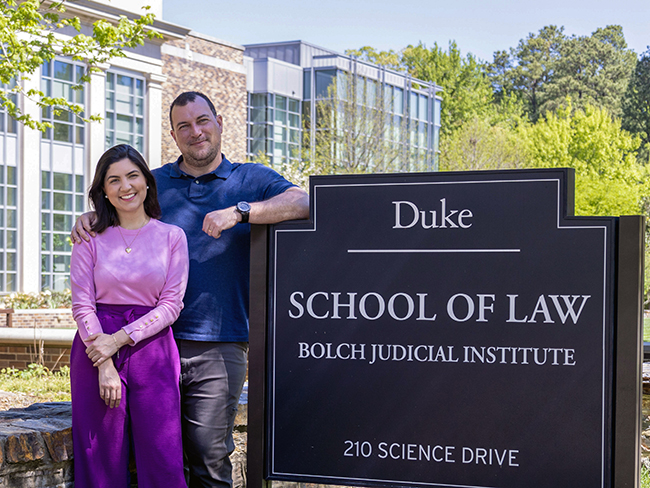Top 10 Duke Law news stories of 2023
A look back at the top 10 stories making headlines at Duke Law in the last 12 months, including hosting U.S. Solicitor General Elizabeth Prelogar, notable additions to faculty and staff, as well as the retirement of faculty giants.

Duke Law School’s top 10 news stories in 2023, measured by online engagement, covered a wide array of achievements, insights, and events featuring members of the Law School community.
During 2023, Duke Law welcomed an outstanding new class of JD students and graduated its first father and daughter LLM students. Clinical faculty were engaged both at the forefront of national legal issues and in providing legal aid locally and throughout the state. The Law School also welcomed lawyer and educator Alison Ashe-Card as its inaugural DEI dean and noted alumna Lauren Fine '11 to the clinical teaching staff, while bidding farewell to Distinguished Professor Lawrence Baxter, an acclaimed legal mind, businessman, and beloved member of the faculty. And Dean Kerry Abrams welcomed distinguished speakers including U.S. Solicitor General Elizabeth Prelogar to the Law School for inspiring and in-depth conversations. Following is a recap of the stories that interested and engaged you the most this year.
10. Claudia Benz ’23 awarded E. Barrett Prettyman Fellowship
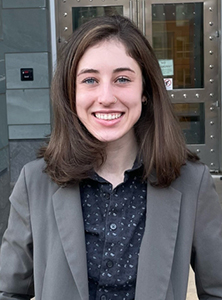 Claudia Benz ’23 was selected for one of two E. Barrett Prettyman Fellowships and joined an intensive two-year training program in criminal trial advocacy and clinical teaching at Georgetown University Law Center in August.
Claudia Benz ’23 was selected for one of two E. Barrett Prettyman Fellowships and joined an intensive two-year training program in criminal trial advocacy and clinical teaching at Georgetown University Law Center in August.
Recipients of the highly competitive fellowship spend their first year representing indigent clients in local courts of the District of Columbia. In the second year fellows take classes in clinical teaching and instruct and supervise students representing defendants in misdemeanor and juvenile cases through Georgetown Law’s Criminal Defense and Prisoner Advocacy Clinic, Criminal Justice Clinic, and Juvenile Justice Clinic. Upon completion of the program fellows receive a master’s degree in advocacy.
“I cannot wait to begin my career as a public defender in a position where I will be trained and try cases under the supervision of incredible attorneys,” Benz said.
9. Lawrence G. Baxter retires from teaching at Duke Law School
Lawrence G. Baxter, an internationally renowned expert in both administrative law and financial regulation whose formidable intellect, global mindset, and bold vision led him to make major contributions in law, business, and society, retired from teaching at Duke Law School in December.
Baxter, the David T. Zhang Professor Emeritus of the Practice of Law, served on the faculty from 1986 to 1995, during which he taught Administrative Law and Criminal Law and created the Law School’s first courses in domestic and international bank regulation. He returned in 2009, when his focus turned to exploring the future of banking regulation after the financial crisis and shaping a new curriculum around the emerging risks to global economies and markets posed by climate change. In between, he spent over a decade as a business executive, steering one of the country’s largest banks to a leading position in online financial services when few others foresaw the transformative potential of the internet.
"I thrive on change. I’m fascinated by the next, the disconnected leap," Baxter said. "Mmy whole career has been the product of lots of luck, but also huge enthusiasm for what I’ve done.”
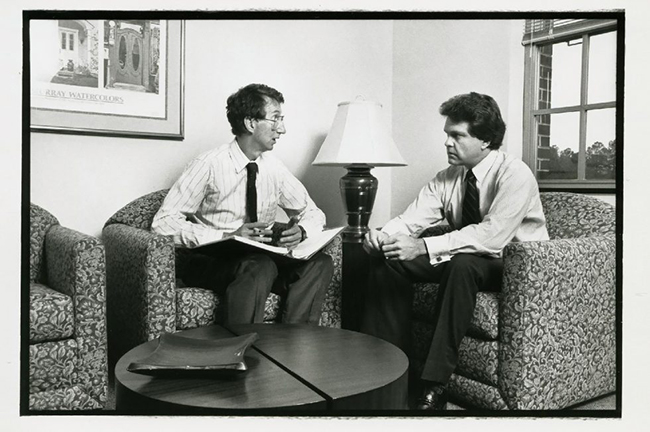
8. Lauren Fine ’11 joins Duke Law as supervising attorney of the Criminal Defense Clinic
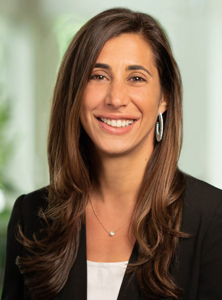 Lauren Fine '11, a nationally recognized advocate for youth justice reform, joined the faculty in July as assistant clinical professor of law and supervising attorney of the Criminal Defense Clinic.
Lauren Fine '11, a nationally recognized advocate for youth justice reform, joined the faculty in July as assistant clinical professor of law and supervising attorney of the Criminal Defense Clinic.
Fine was previously the Stoneleigh Visiting Fellow at the Quattrone Center for the Fair Administration of Justice at the University of Pennsylvania Carey Law School. She stepped down in January 2022 as co-director of the Youth Sentencing & Reentry Project (YSRP), a Philadelphia-based organization she co-founded to keep children out of adult jails and prisons and support people incarcerated as youths as they return to their communities.
“Lauren has tremendous skill and experience in the mitigation, re-entry, and systemic advocacy spaces that will expand what we’re already doing at the individual client level,” said Clinical Professor Elana Fogel, director of the Criminal Defense Clinic, which completed its inaugural semester in the spring.
7. Ludington and Martin discuss Supreme Court cases on social media blocking by public officials
On Oct. 31, the Supreme Court heard oral arguments in two cases involving whether public officials are engaging in state action when they block people from their social media accounts, thereby violating their First Amendment rights.
In O’Connor-Ratcliff v. Garnier, the Ninth Circuit Court of Appeals held that two California school board members “acted under the color of state law” when they blocked parents who posted critical comments on their social media pages. But in Lindke v. Freed, the Sixth Circuit ruled that a city manager in Michigan was not acting in an official capacity when he blocked a user on Facebook. The two cases reflect a general split across five circuits in this relatively new body of case law.
First Amendment Clinic Director Sarah Ludington JD/MA ’92 and Supervising Attorney Amanda Martin say complaints about selective social media blocking are becoming more common among potential clients who reach out to the clinic for legal help. They include a Hope Mills, North Carolina, resident who was blocked from the town mayor’s Facebook page, which the mayor was using for town business, after posting an opposing view on development plans. That case was included in an amicus brief that Ludington, Martin, and the clinic's Local News Fellow Kyle Compton submitted to the Supreme Court in Lindke v. Freed.
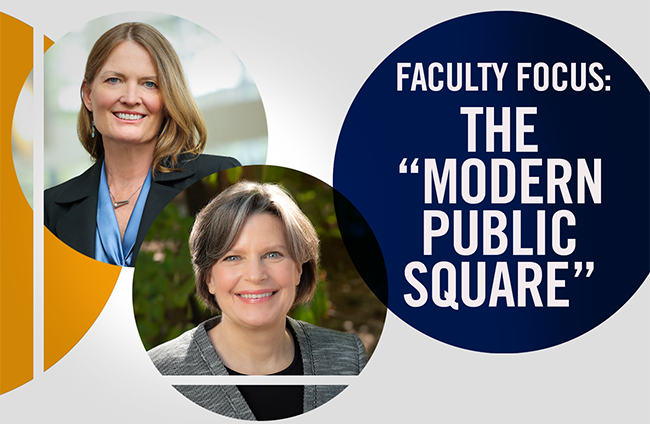
6. Clinic Spotlight: The Community Enterprise Clinic
The Community Enterprise Clinic serves nonprofit organizations and social entrepreneurs that need assistance with planning and implementing community development projects. Working under the supervision of Andrew Foster, the Kathrine Robinson Everett Clinical Professor of Law and the clinic’s director, students serve as outside general counsel to nonprofits that directly benefit the Durham community, taking transactional projects from conception to implementation in areas such as affordable housing, community revitalization, business formation, and public policy.
A story on several examples of the clinic's recent work with clients was featured in the fall 2023 issue of Duke Law Magazine.

5. Convocation - Kate Adams, general counsel of Apple speaks to Class of 2023
Kate Adams, senior vice president and general counsel for Apple, the world's most valuable company, told Duke Law School’s class of 2023 to be generous, take risks, and seek ways to make each moment count during their May 13 Convocation ceremony.
“Our journey as professionals is a marathon, not a sprint,” said Adams. “So savor each moment, and seize today’s opportunity to enrich your lives and the lives of those around you.”
Adams recounted her journey of finding fulfillment in unexpected places during the event in Cameron Indoor Stadium honoring graduating JDs and LLMs.
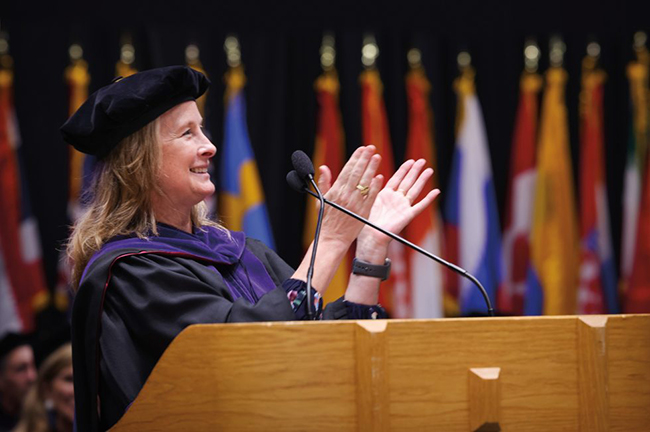
4. Alison Ashe-Card joins Duke Law as inaugural DEI dean
Alison Ashe-Card, an experienced litigator, career services professional, and champion of diversity, equity, and inclusion in legal education and the legal profession, joined Duke Law School July 1 in a new senior leadership role.
As Duke Law’s inaugural associate dean for diversity, equity, and inclusion, Ashe-Card reports to Dean Kerry Abrams and has overall responsibility for developing and advancing DEI initiatives and supporting an inclusive climate throughout the Law School. Her portfolio of responsibilities includes collaborating with other leaders in the Law School community to help each unit achieve, track, and communicate its DEI goals; acting as a resource to individual students and student organizations in navigating inclusion and equity challenges; and representing the Law School in university-wide DEI efforts.
“I hope that as people see me in spaces throughout the Law School, they can recognize that I’m someone who you can very easily approach," Ashe-Card said. "I remember what it was like being in a law school and knowing that there was somebody that I could talk to.”
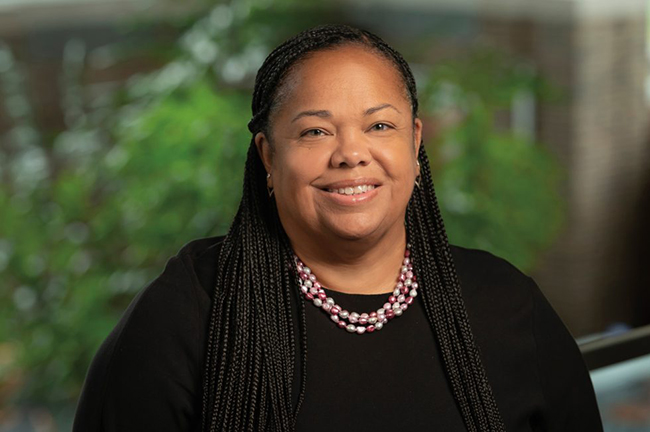
3. Meet the JD Class of 2026
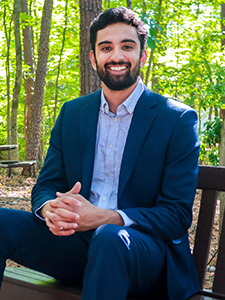
Five members of the JD Class of 2026, whose academic experience and professional aspirations reflect the excellence and diversity of the 1Ls, talked about their background, career goals, and what led them to pursue their degree at Duke Law.
Harvard grad Lisette León ’26 believes in extending the hand of legal aid to those for whom it is often out of reach. “Kindness and compassion are two large pillars in lawyering for me. It’s important to remind ourselves in the legal aid space that often times these people are coming to us in some of their worst times of their lives, so I think as I go through and become a lawyer, those are two qualities I want to keep close.”
Will Allred ’26 was deployed in Okinawa, Japan, at the time of the January 6 Capitol riot, an event he says sparked an interest in continuing to serve his country through a legal lens. “Any form of law that has to do with connecting the will of the people with who represents them in our government, that feels like an extension of the military oath to support and defend the Constitution against all enemies foreign and domestic.”
Rohen Sukkawala JD/ LLMLE ’26 worked in finance after graduation before starting his own business. “I interacted with a lot of attorneys, which was an unexpected but fascinating aspect of the job. I realized that I wanted to be more involved in the legal side of business, so I took the LSATs and applied.”
While a pre-med at UVA, Jonathan Mondrey, Jr. ’26 had a change of heart and chose to pursue a career in law, viewing it as “that one area of society that, regardless of whatever race, religion, identity, or background we come from, we are all supposed to be treated as equals."
With a passion for law and a degree in international politics, Julia Benbenek JD/LLM ’26 enrolled in Duke Law’s dual-degree in International and Comparative Law program. “I am really interested in exploring international arbitration in law school, which I think might be an area of similar subject matter in terms of that international scope but requires a bit more of that unique problem-solving element that I felt lacking in transactional and regulatory work.”
2. Solicitor General Elizabeth Prelogar discusses career, the Court during visit to Duke Law
U.S. Solicitor General Elizabeth Prelogar urged students to “make yourself uncomfortable” during a Sept. 11 event at Duke Law School.
Nominated by President Joe Biden and confirmed by the Senate in October 2021, Prelogar is the 48th solicitor general and second woman to serve as the nation’s chief appellate lawyer. She served as acting solicitor general and principal deputy solicitor general prior to her confirmation, and previously served as an assistant to the solicitor general from 2014 to 2019.
“It’s easy to do the things that you’re good at and the things that are comfortable to you,” said Prelogar, who appeared in conversation with Dean Kerry Abrams as part of the “Lawyers and Leaders” series. “But when I think about moments in my career and life when I’ve really grown as a lawyer, obviously, but also grown as a person, it is when I’ve pushed myself outside my comfort zone.”
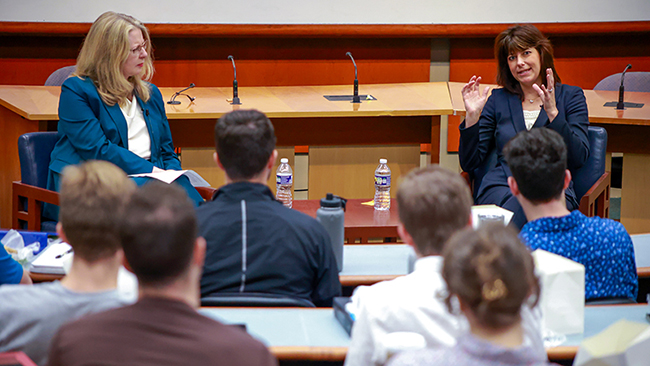
1. Duke Law graduates first father and daughter LLM students
This year, a father and his daughter graduated from the LLM Master of Laws program – a first for the Law School. André Pinelli LLM ’23 and Lorena Carvalho Pinelli LLM ’23, both lawyers from Brazil, said having their family with them while pursuing their degrees was an integral part of their law school experience.
André and Lorena say they discovered they’d been pondering an LLM degree separately when the pandemic brought Lorena back home from practicing law in Rio. Going to Duke Law not only enriched their skills and goals as legal professionals, but also found them opening their home to fellow LLM and JD students.
“I think being a family here together, we’ve almost become a support for other students,” Lorena said. “We had them over here for Christmas, for Thanksgiving, and other occasions. It’s just great to have your support here.”
